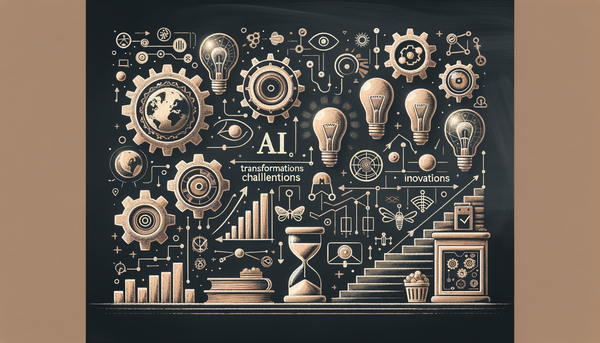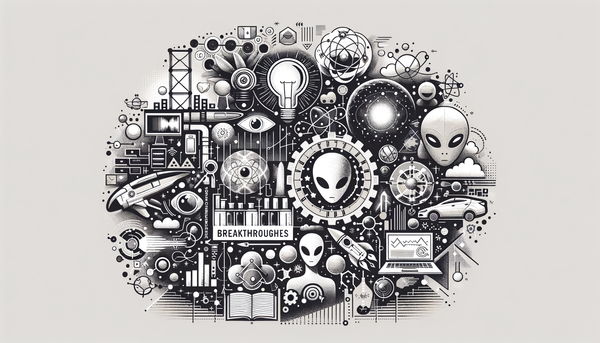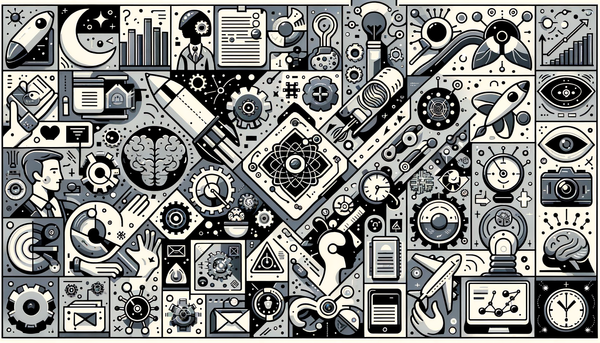AI News Podcast Update: The Current State of AI Innovations
Controversy, creativity, and cutting-edge innovation intertwine in today’s AI landscape where political satire meets design mishaps, entertainment contract negotiations spark reform, and classrooms evolve with tailored learning—all while ethical debates about data scraping and leadership transitions shape the future of technology.
Political Irony and AI-Generated Controversies
The power of AI to create and disrupt has never been more evident than in recent political spectacles. An AI-generated image featuring former President Donald Trump depicted as a Pope set off a firestorm of responses. This image, released amid the solemnity following Pope Francis’s death, hit a nerve with many devout observers, illustrating how a digital jest can rapidly become a point of contention when intersecting with deep-rooted religious sentiments.
Critics condemned the image for trivializing revered traditions, with voices from the Catholic community echoing what many saw as a misguided marriage of humor and politics. Prominent figures such as New York Archbishop Timothy Dolan lamented the portrayal as a “brutta figura,” cautioning that such missteps might leave lasting impressions on interconnected religious and political landscapes. In an intriguing twist, Trump’s own retorts added layers of irony and denial. Emphasizing that he knew nothing about the image’s origin and citing his attendance at Pope Francis’s funeral as evidence of his respect for religious customs, he quipped that critics “can’t take a joke.”
This episode is a vivid reminder of how humor in the digital age, propelled by AI’s capacity for rapid content creation, can ignite debates that bridge the gap between political theater and social sensitivity. For more insights on the interplay of politics and innovation in AI, readers can explore the transformative journey covered in our AI Podcast Episode and the discussions on latest AI updates posted on AI.Biz.
Quirky Creations: When AI Misses the Mark on Context
In a lighter yet equally provocative display of AI’s limitations, a bizarre trailer-hitch-shaped camper emerged as a testament to the technology’s occasional lapses in context and coherence. What began as a simple image of a hitch receiver morphed inexplicably into a fantastical camper design—an output that left many scratching their heads. This incident, highlighted in critical commentary online, underscores that despite its visual prowess, AI lacks the inherent human intuition to discern practical or contextual relevance in its creative outputs.
Humorously, the misstep has reignited debates about the boundaries between algorithmic creativity and the nuanced understanding that human designers bring to the table. As one playful commentator noted, such misfires not only entertain but also remind us of the essential differences between machine-generated art and the thoughtful crafting of human creativity. This paradox has become a fertile ground for reflection as we anticipate further evolution in how AI can better learn context and practicality.
Entertainment in the Age of AI: Contracts, Films, and Protection Safeguards
The influence of AI is reshaping not only our creative industries but also the contractual frameworks that govern them. One striking example comes from the entertainment sector, where SAG-AFTRA is actively integrating AI protections into forthcoming studio contracts. During a recent panel discussion, Duncan Crabtree-Ireland, the guild’s chief negotiator, articulated that new contract negotiations will emphasize restrictions on the use of actors’ works for training AI systems without explicit consent or fair compensation. This marks a significant departure from previous agreements and reflects a broader industry response to protecting creative labor in an era dominated by digital technologies.
Such strides have resonated across the entertainment landscape, where even film creatives have weighed in. Although details are still emerging regarding AI’s role in shaping film narratives—as seen with Cinephile Natasha Lyonne’s spirited defense of AI-driven filmmaking in her promotion of “Uncanny Valley”—the dialogue remains robust. These discussions emphasize that while AI fuels innovation, fostering respect for human creativity and labor remains paramount.
For further exploration of how AI is transforming industries from fan experiences to behind-the-scenes contractual safeguards, our readers might find the article on impact of AI across industries quite illuminating.
Revolutionizing Gaming: Nvidia’s DLSS 4 and the Visual Frontier
Among the most visible manifestations of AI innovation is Nvidia’s DLSS (Deep Learning Super Sampling) technology—a game-changer for the graphics realm that marries sophisticated upscaling with real-time performance enhancements. In rigorous tests spanning multiple Nvidia GPU generations (from the 20-series to the groundbreaking 50-series), DLSS 4 has been scrutinized for its ability to optimize gaming experiences by enhancing frame rates and image quality.
Advanced models, like the Transformer model integral to DLSS 4, demonstrate how AI can bridge the gap between raw hardware potential and immersive visual storytelling. However, these models also reveal an inherent limitation: compatibility challenges across select gaming titles, underscoring the ongoing dialogue between hardware capabilities and software optimization. Gamers now find themselves weighing the benefits of upgrading to the latest GPUs against the potential for technical hiccups caused by evolving technologies.
Through comprehensive lab assessments featured by technology luminaries such as Will Smith and Brad Chacos, it’s clear that while DLSS 4 sets a high bar for graphical performance, the journey toward universal compatibility remains a work in progress, mirroring broader AI challenges—and triumphs—in various industries.
Leadership Transitions and Ethical Quandaries in Tech Startups
Leadership changes often herald not only strategic pivots but also recalibrations in how companies address the ethical complexities of a rapidly evolving tech environment. The recent transition at AI startup 11x, with CEO Hasan Sukkar stepping down to become a non-executive chairman and handing the reins to CTO Prabhav Jain, reflects a broader trend of reinvention in an increasingly competitive market.
This change, set against the backdrop of over $70 million in investment and reports of operational challenges, symbolizes the balancing act startups must perform between ambitious scaling and maintaining robust internal cultures. The narrative of 11x dovetails with wider concerns about AI’s role in the marketplace, where both innovation and ethical transparency are under close scrutiny.
Meanwhile, Palantir Technologies—long a staple in military and data analytics—continues to straddle the line between avant-garde AI-driven intelligence and ethical debates surrounding privacy and public accountability. With expectations of revenue surges bolstered by strategic contracts, the company’s trajectory is a microcosm of the broader industry tension: the drive for technological advancement alongside looming questions of moral responsibility.
"I imagine a world in which AI is going to make us work more productively, live longer, and have cleaner energy."
– Fei-Fei Li, The Quest for Artificial Intelligence
Such leadership shifts and evolving business strategies underscore that while industry titans are racing ahead with technological promises, the need for ethical frameworks and forward-thinking governance remains as crucial as ever.
Transforming the Classroom: AI’s Promise in Education
Education stands on the cusp of a digital revolution, with AI poised to usher in a transformative era that extends well beyond automated grading. Visionaries like Sal Khan are reimagining classrooms where tailored learning pathways empower every student. By harnessing AI to delineate each learner’s strengths, weaknesses, and preferences, educators can deliver individualized content, transforming conventional pedagogical models into vibrant, student-centered experiences.
Imagine a classroom that not only reduces administrative burdens but also acts as an extension of a personalized tutor. AI’s capabilities enable immediate access to interactive modules, supplemental online tutoring, and real-time performance analytics. Yet, as with all breakthroughs, equitable access emerges as a critical concern. Bridging the digital divide is essential to ensure that AI-driven learning benefits every student, regardless of background.
This evolving vision for education is discussed extensively in recent conversations on AI in education, highlighting both the immense promise and the learning curve that teachers and institutions will face as they adapt. For educators and tech enthusiasts alike, this represents a brave new era where technology and human insight come together to foster a richer learning environment.
Data Ethics Under the Lens: Google's Controversial Scraping Practices
At the intersection of innovation and ethical accountability, the practices of tech giants are scrutinized relentlessly. Google’s recent testimony in a federal antitrust trial has shined a spotlight on its approach to data collection—a practice that has raised significant concerns among publishers and data privacy advocates. Despite allowing publishers to opt out of having their content used for training AI systems in some divisions, Google’s other units, particularly those powering its search engine, continue to aggregate data without clear-cut restrictions.
This predicament underscores a profound conflict between technological progress and consent ethics. With billions of tokens of data harvested—even from sources explicitly wishing to remain untouched—the implications for user privacy and publisher rights are enormous. It is a stark reminder that as we embrace the benefits of AI, parallel conversations around trust, transparency, and regulatory oversight must not be neglected.
The ongoing legal debates and federal rulings regarding Google's dominance further emphasize the urgent need for a balanced framework that fosters innovation while upholding ethical standards. The tension between market power and responsible data usage remains a pivotal challenge for the future of AI.
Charting the Future: Where Innovation Meets Responsibility
The multifaceted narrative of AI—from political satire and whimsical design errors to transformative approaches in education and ethical quandaries in data usage—paints a complex picture of the present and future. Each episode in this unfolding saga is a testament to the dual nature of technological progress: one that offers expansive possibilities while demanding conscientious reflection on societal impacts.
Whether it is through groundbreaking technologies like Nvidia’s DLSS 4 enhancing our gaming experiences or evolving contractual safeguards in the entertainment industry ensuring that creative talents are duly protected, the interplay between technology and human values remains central to the AI narrative. As Palantir pushes the boundaries of defense analytics or startups like 11x recalibrate their strategies amidst fierce competition, the underlying theme is clear: innovation thrives best when coupled with accountability.
For those eager to follow the latest developments in this dynamic realm, I invite you to dive into more detailed discussions available on our AI.Biz website—explore our in-depth coverage on transformative AI journeys, review our industry impact analyses, and stay updated with discussions on AI transformations and challenges.
Final Reflections
The evolving AI landscape stands as a mirror to society’s aspirations and anxieties—a realm where absurdity meets brilliance, and where every breakthrough carries with it profound ethical, social, and cultural imperatives. In navigating these turbulent yet exhilarating times, we are reminded that while technology may push us forward, our shared human values must define the path we take.




